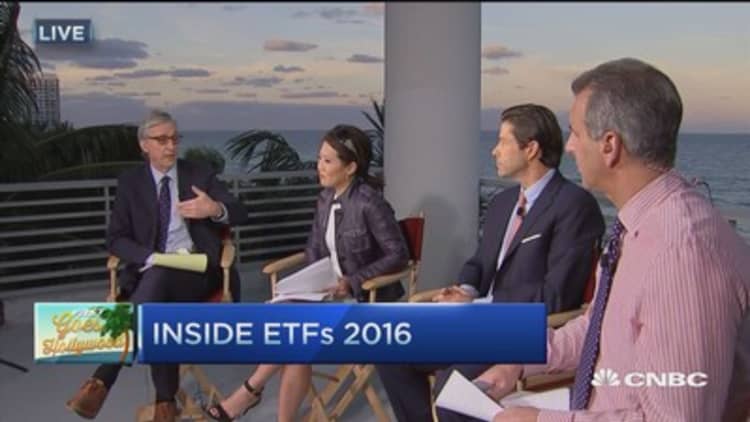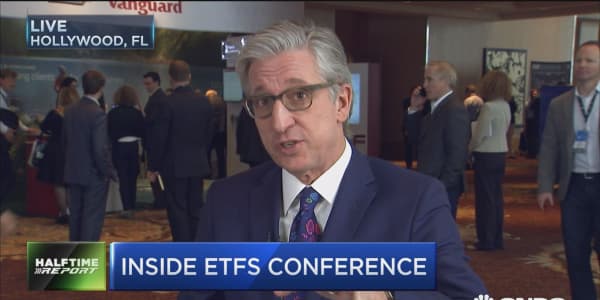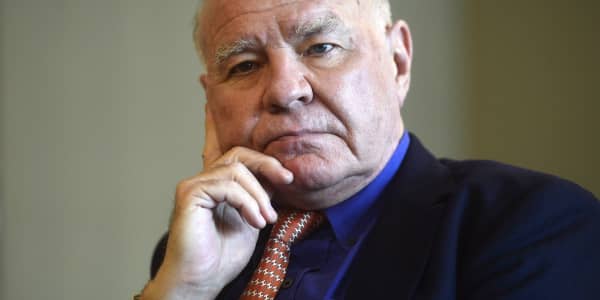The bull market still has some believers — and not just those investors buying Facebook on Thursday but a chief investment strategist whose firm handles $2.5 trillion in investments.
A brutal start to the trading year and weaker U.S. economic data have many market watchers calling for continued pain in stocks — if not also a looming U.S. recession. But not Charles Schwab chief investment strategist Liz Ann Sonders. She just made maybe the boldest call of all: belief in a continued bull market run and confidence that a recession isn't happening anytime soon.
Sonders said that the tumult this year likely marks a brief interruption to the bull market.
"We probably have a ways to go before the next recession," Sonders said on Wednesday at the "Inside ETFs" conference in Hollywood, Florida.
"We don't think it's 2008."
There are plenty of reasons to not buy into Sonders' argument.
Stocks were all over the place on Thursday — opening up, then heading down, before going back up again at midday. The and Dow Jones Industrial Average have both lost roughly 8 percent of their value this year, with lower oil prices and fears about the U.S. economy, among other factors, clouding investor sentiment.
We probably have a ways to go before the next recession. ... We don't think it's 2008.Liz Ann SondersCharles Schwab chief investment strategist
Others at the ETF conference this week had difficulty stirring up optimism. "Dr. Doom" Marc Faber predicted that stocks would fall even more as markets adjust to the reality of a looming recession. Mark Yusko of Morgan Creek Capital Management said that either the U.S. or Europe could fall into a recession this year. Vanguard Group CEO Bill McNabb said investors should expect no better than 5 percent to 7 percent returns over the next decade for a diversified portfolio of stocks and bonds.
How bold were the bear calls at the ETF conference? Both Faber and Dennis Gartman used the term "Not in my lifetime" to lay out their belief as to when stocks and oil, respectively, would really rally.
The Commerce Department's Thursday announcement that durable goods orders declined in December did not help to calm fears of a slowdown in the U.S. economy.
Sonders did acknowledge the prevailing sentiment: She said Schwab is "cautious" about markets currently and that the global economy has entered a "funky environment." But she laid out a detailed case for why predictions of a coming crash are overblown.
For one, the crude oil price decline recently reached an "extreme" near-$30 per barrel, Sonders said. She contended that low prices will eventually force supply cuts, giving the commodity some room to recover.

On Thursday, reports that Russia and the Organization of the Petroleum Exporting Countries — specifically Saudi Arabia — could cut production sent both U.S. and Brent crude prices higher, but later there were conflicting reports that said no such deal were in the works.
Sonders also downplayed concerns about slowing growth in China, stressing that weakness in exports to China would not take a meaningful chunk out of U.S. gross domestic product.
"We are not terribly worried about what's happening in China," she said.
Sonders added that the likelihood of temporary corrections or pullbacks increases the longer a bull market persists. After the six-plus years run-up in stocks following the recovery from the financial crisis, a slide does not necessarily spell doom, she said.
And she stressed that while consumers were heavily exposed to the mid-2000s housing collapse, they largely benefit from lower oil prices.
CORRECTION: An earlier version misstated Sonders' title and how Schwab's investments are made. Sonders is Schwab's chief investment strategist and her firm handles $2.5 trillion in investments.






